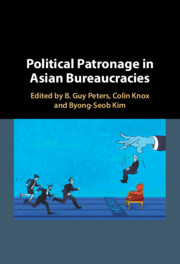Book contents
- Political Patronage in Asian Bureaucracies
- Political Patronage in Asian Bureaucracies
- Copyright page
- Contents
- Figures
- Tables
- Contributors
- Abbreviations
- 1 Patronage in Asian Political Systems
- Part I One-Party Dominated Systems
- 2 Governing the Global City’s Mandarinate
- 3 Patronage and Politicisation in the Indian Administrative Service
- 4 Political Patronage, Civil Service Politicization, and the Ordeals of Career Civil Servants
- Part II Two-Party/Multi-Party Systems
- Part III Autocracies
- Index
- References
2 - Governing the Global City’s Mandarinate
Politically Motivated Appointments in Singapore’s Public Sector
from Part I - One-Party Dominated Systems
Published online by Cambridge University Press: 05 October 2023
- Political Patronage in Asian Bureaucracies
- Political Patronage in Asian Bureaucracies
- Copyright page
- Contents
- Figures
- Tables
- Contributors
- Abbreviations
- 1 Patronage in Asian Political Systems
- Part I One-Party Dominated Systems
- 2 Governing the Global City’s Mandarinate
- 3 Patronage and Politicisation in the Indian Administrative Service
- 4 Political Patronage, Civil Service Politicization, and the Ordeals of Career Civil Servants
- Part II Two-Party/Multi-Party Systems
- Part III Autocracies
- Index
- References
Summary
Singapore’s civil service has been lauded as one of the successful case studies globally. The emphasis on meritocracy has been the hallmark of Singapore’s governance. This principle remains a guiding philosophy for the dominant People’s Action Party (PAP). Political analysts often attributed “the Singapore miracle” to its corruption-free, highly professional, technocratic government. Still, certain segments of Singapore’s civil service bear the institutional and cultural vestiges of politically motivated appointments. In this chapter, we first analyze the process of selecting top public service positions, showing how political considerations are factored into these appointments. Second, using the case of the People’s Association, we explore the “public service” face of para-political organizations and demonstrate how appointments and politics of urban governance are intertwined. The chapter offers us insights on how political interests and concerns persist despite the progress in public governance, and on the role of elite networks and political regime-making in shaping public sector opportunities.
- Type
- Chapter
- Information
- Political Patronage in Asian Bureaucracies , pp. 25 - 48Publisher: Cambridge University PressPrint publication year: 2023



